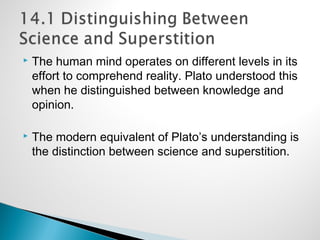
Chapter 14 hurley 12e
- 1. The human mind operates on different levels in its effort to comprehend reality. Plato understood this when he distinguished between knowledge and opinion. The modern equivalent of Plato’s understanding is the distinction between science and superstition.
- 2. Superstition, like science, involves hypotheses, so superstitious hypotheses can and should be evaluated according to the criteria, developed previously, for evaluating scientific hypotheses. Distinguishing science from superstition involves psychological and volitional elements. Our criteria must include those elements, which are: ◦ Evidentiary support. ◦ Objectivity. ◦ Integrity.
- 3. Scientific evidence usually involves measurements of things such as force, mass, levels of aggression, social affluence, and so on, usually acquired through instrumentation and expressed mathematically. ◦ The means of acquisition and expression are one of the key features that distinguishes science from superstition. ◦ Scientific hypotheses are about the natural world, so only observations of the natural world count as evidence.
- 4. What counts as evidence? ◦ Creditable reports of observations and measurements, usually expressed mathematically, can be accepted as conveying evidence, for scientific purposes. Unreliable evidence: ◦ Religious books and other appeals to authority. However spiritually and politically meaningful, they do not confirm or refute scientific hypotheses. ◦ Anecdotal evidence can point to scientifically-confirmable evidence but doing so requires experimentation and observation conducted according to scientific criteria.
- 5. Reliable scientific experiments must meet the following criteria: ◦ Scientific experiments must be replicable under controlled conditions. This means that the experiment must be repeatable at different times and at different places. ◦ Scientific hypotheses are phrased precisely, usually in mathematical language, to provide for extremely accurate confirmations. Philosopher Karl Popper argued that any genuinely scientific hypothesis must be framed narrowly enough that it forbids certain things from happening.
- 6. ◦ Ad hoc modifications can ruin hypotheses. They are often the result of a researcher drawing an excessively broad hypothesis that does not explain reasonably foreseeable problems and anomalies. Ad hoc modifications can also complicate a hypothesis, making the hypothesis difficult to apply accurately. ◦ Naturalistic explanations, and those based on known realities, are preferred to those based on the superstitious or bizarre. ◦ Finally, science is progressive; superstition is not. This means that a hypothesis supported by evidence will lead to predictions that are true.
- 7. Our beliefs about the world are objective to the extent that they are unaffected by conditions peculiar to the experiencing subject. ◦ Superstitions exist to satisfy emotional needs, especially to help us cope with fear and anxiety. Superstition helped people cope with the fact that for much of human history, people died very suddenly and there was little, if anything, most people could do to help them.
- 8. ◦ People are fascinated by the mysterious. It is sometimes more emotionally satisfying to believe a magical explanation than a scientific one. ◦ Many people are also mentally lazy. Once we learn to think sloppily, it takes effort to learn to think rigorously. ◦ Our observation of the world can be distorted by appeals to our emotion. An example of this is the placebo effect, in which people can be led to believe a medicine or procedure that has no therapeutic value can help them— and it does.
- 9. ◦ We perceive what we expect to perceive. Pareidolia is our projection of familiar visual images onto vague, relatively formless sensory stimuli, such as the face of Jesus in the skillet or burns on a tortilla. The perceptual set refers to our tendency to perceive events and objects in a way that our prior experience has led us to expect. Do you see the white triangle in the image below?
- 10. ◦ Hallucinations distorted perception, particularly when we are either falling asleep or waking up. At such times, people often experience very vivid, realistic and emotionally charged images. Collective hallucinations often happen when a crowd is in a heightened emotional state. ◦ Confabulation can produce false recollections. We recall memories in bits and pieces, and the brain fills in the gaps between those bits (“confabulation”). Our brains normally and naturally attempt to produce a coherent account of an event, but our emotions, other people’s reactions, and repeatedly reporting events can influence the accuracy of our memories.
- 11. Integrity requires honesty in gathering and presenting evidence and responding to theoretical problems with honest, logical thinking. Integrity is central to the scientific process and its lack, central to the practice of superstition. ◦ Faked evidence is the clearest indication of lack of integrity. This can range from astrology and pretending one can bend metal with one’s mind to falsifying studies that vaccines cause autism.
- 12. ◦ The puzzle-solving character of science differentiates it from pseudoscience. When scientists are confronted with a problem, they tend to work at it until they solve it. Astronomers took 300 years to solve the puzzle of stellar parallax. Astrologers do not figure out what went wrong when their predictions fail to materialize. ◦ A hypotheses that is inconsistent with established theories or laws tends to be a sign of superstition. One excellent example is the belief of some yoga practitioners that they can levitate. This is inconsistent with the well-established law of gravity.
- 13. Distinguishing between science and superstition is the hallmark of civilization. Scientifically grounded hypotheses are: ◦ Coherent. ◦ Precisely tailored. ◦ Narrowly formulated. ◦ Supported by genuine evidence. ◦ Productive of new insights. “Then a miracle occurs,” is a famous cartoon line. It’s not acceptable in science.